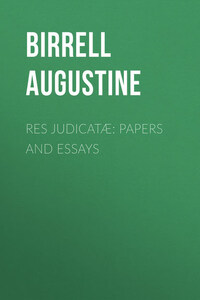The first two essays in this volume were composed as lectures, and are now printed for the first time; the others have endured that indignity before. The papers on 'The Letters of Charles Lamb' and 'Authors in Court' originally appeared in Macmillan's Magazine; and the short essays entitled 'William Cowper' and 'George Borrow' in the Reflector, a lively sheet which owed its existence to and derived its inspiration from the energy and genius of the late Mr. J. K. Stephen, whose too early death has not only eclipsed the gaiety of many gatherings, but has robbed the country of the service of a noble and truth-loving man.
The other papers appeared either in Scribner's Magazine or in the columns of the Speaker newspaper.
Although, by the kindness of my present publishers, I have always been practically a 'protected article' in the States, I cannot help expressing my pleasure in finding myself in the enjoyment of the same modest rights as an author in the new home of my people as in the old.
Lincoln's Inn, London.
A LECTURE
It is difficult to describe mankind either in a book or in a breath, and none but the most determined of philosophers or the most desperate of cynics have attempted to do so, either in one way or the other. Neither the philosophers nor the cynics can be said to have succeeded. The descriptions of the former are not recognisable and therefore as descriptions at all events, whatever may be their other merits, must be pronounced failures; whilst those of the cynics describe something which bears to ordinary human nature only the same sort of resemblance that chemically polluted waters bear to the stream as it flows higher up than the source of contamination, which in this case is the cynic himself.
But though it is hard to describe mankind, it is easy to distinguish between people. You may do this in a great many different ways: for example, and to approach my subject, there are those who can read Richardson's novels, and those who cannot. The inevitable third-class passenger, no doubt, presents himself and clamours for a ticket: I mean the man or woman who has never tried. But even a lecturer should have courage, and I say boldly that I provide no accommodation for that person tonight. If he feels aggrieved, let him seek his remedy – elsewhere.
Mr. Samuel Richardson, of Salisbury Court, Fleet Street, printer, was, if you have only an eye for the outside, a humdrum person enough. Witlings, writing about him in the magazines, have often, out of consideration for their pretty little styles, and in order to avoid the too frequent repetition of his highly respectable if unromantic name, found it convenient to dub him the 'little printer.'
He undoubtedly was short of stature, and in later life, obese in figure, but had he stood seven feet high in his stockings, these people would never have called him the 'big printer.' Richardson has always been exposed to a strong under-current of ridicule. I have known people to smile at the mention of his name, as if he were a sort of man-milliner – or, did the thing exist, as some day it may do, a male nursery-governess. It is at first difficult to account for this strange colouring of the bubble reputation. Richardson's life, admirable as is Mrs. Barbauld's sketch, cannot be said to have been written – his letters, those I mean, he wrote in his own name, not the nineteen volumes he made his characters write, have not been reprinted for more than eighty years. He of all men might be suffered to live only in his works, and when we turn to those works, what do we find? Pamela and Clarissa are both terribly realistic; they contain passages of horror, and are in parts profoundly pathetic, whilst Clarissa is desperately courageous. Fielding, with all his swagger and bounce, gold lace and strong language, has no more of the boldness than he has of the sublimity of the historian of Clarissa Harlowe. But these qualities avail poor Richardson nothing. The taint of afternoon tea still clings to him. The facts – the harmless, nay, I will say the attractive, facts – that he preferred the society of ladies to that of his own sex, and liked to be surrounded by these, surely not strange creatures, in his gardens and grottos, first at North End, Hammersmith, and afterwards at Parsons Green, are still remembered against him. Life is indeed full of pitfalls, if estimates of a man's genius are to be formed by the garden-parties he gave, and the tea he consumed a century and a quarter ago. The real truth I believe to be this: we are annoyed with Richardson because he violates a tradition. The proper place for an eighteenth-century novelist was either the pot or the sponging house. He ought to be either disguised in liquor or confined for debt. Richardson was never the one or the other. Let us see how this works: take Dr. Johnson; we all know how to describe him. He is our great moralist, the sturdy, the severe, the pious, the man who, as Carlyle puts it in his striking way, worshipped at St. Clement Danes in the era of Voltaire, or, as he again puts it, was our real primate, the true spiritual edifier and soul's teacher of all England? Well, here is one of his reminiscences: 'I remember writing to Richardson from a sponging-house and was so sure of my deliverance through his kindness and liberality, that before his reply was brought I knew I could afford to joke with the rascal who had me in custody, and did so over a pint of adulterated wine for which at that moment I had no money to pay.'








